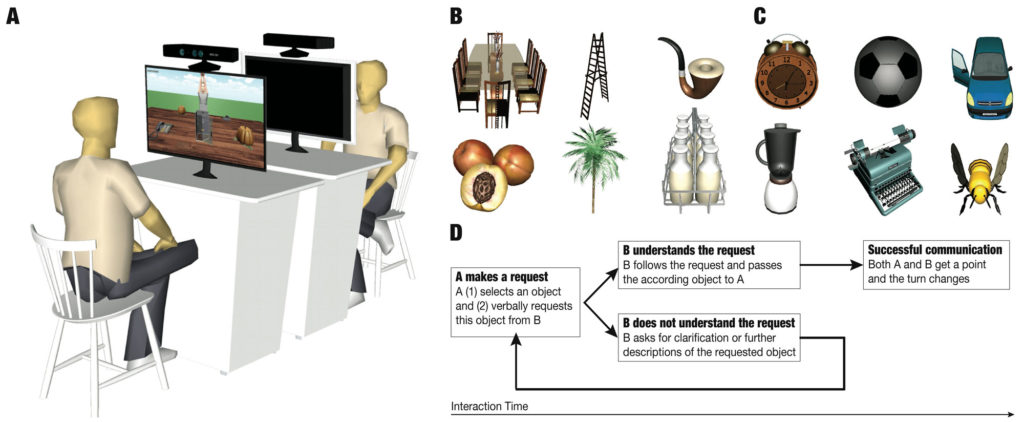
In a study published today in the journal Stroke, a research group led by psychologist and neuroscientist Paül Verschure, ICREA research professor at IBEC, has demonstrated the efficacy of virtual reality (VR) treatment based on learning principles, which could be included in clinical practice and would allow people with aphasia (the neurological disorder caused by damage to the area of the brain responsible for language) to gain access to continuous treatment even at the chronic stage of the illness.
Aphasia occurs mostly in adults who have suffered a cerebrovascular accident or a traumatic brain injury. The specific impairment and its severity will depend on the exact location and grade of the brain damage. Specifically, Broca’s aphasia refers to difficulties in expressing oneself when speaking. People with this syndrome have severe difficulties in finding words and articulating phrases in a fluent manner.
Randomised Controlled Trial
In a Randomised Controlled Trial (RCT), researchers treated 17 patients with chronic Broca’s aphasia (persisting six months after the cerebrovascular accident) and divided them into two parallel groups. One of the groups, the control group, received standard treatment targeting specific linguistic deficits in a therapist-patient setting. The other group, the experimental group, received therapy augmented with RGSa (Rehabilitation Gaming System for aphasia), which provided multi-modal lexical and syntactic building targeted at daily tasks. The same therapy intensity was applied to both groups and they both used the same materials during daily sessions for two months.
After the two months of therapy, the results in the primary testing revealed that both groups had significantly improved, after assessing language function in people with language disorders, and in secondary testing, after assessing other parameters such as lexical access and speech execution in the prepared stimuli, amongst others. However, only the group treated with RGSa improved in communicative frequency and effectiveness in their daily life at the end of the study and, furthermore, significantly sustained improvements in testing after the 8- week period.
Sessions with the Rehabilitation Gaming Systems for aphasia (RGSa)
In the RGSa sessions, which were supervised by an assistant and did not feature any elements of the standard therapy, patients sat in pairs across from each other with their respective screens and interacted by making planar arm movements which were tracked and mapped onto the upper limbs on their avatars, which enabled them to interact with virtual objects.
The practice, which occurred in a game format and was based on Intensive Language-Action Therapy (ILAT), required the patients to engage in daily communication acts, requesting objects from the other player or giving the other player objects when he requested. “The RGSa system, is based on evidence that there are bidirectional links between the motor system and linguistic systems, for that reason it enables the contextualised use of both arms to target the performance of specific objectives”, notes Paül Verschure.
“Specifically, RGSa supports the understanding that the neuronal activity which is boosted during language processing and which is undertaken via the simultaneous execution of specific movements and the use of associated vocabulary can facilitate linguistic performance, and vice versa”, adds Verschure. In fact, the results display a positive trend also in the tests assessing motor function. For this reason, scientists will research language integration in actions aimed at recuperation in motor disorders such as, for example, hemiparesis, which refers to diminished motor force or partial paralysis which affects the limbs on one side of the body.
“The results emphasise the potential of RGSa to improve and stabilise the long-term effects of language training. From a healthcare perspective, RGSa could be included in clinical practice, thus enabling people with aphasia to gain access to continuous treatment at their own pace and at the chronic stage of the illness”, states Klaudia Grechuta, PhD student in the SPECS group at IBEC and lead author of the article.
Reference article: Klaudia Grechuta, Belén Rubio Ballester, Rosa Espín Munne, Teresa Usabiaga Bernal, Begona Molina Hervás, Bettina Mohr, Friedemann Pulvermüller, Rosa San Segundo, Prof. Paul Verschure, (2019) Augmented dyadic therapy boosts recovery of language function in patients with non-fluent aphasia: a randomised controlled trial. Stroke. 2019;50:1270–1274





